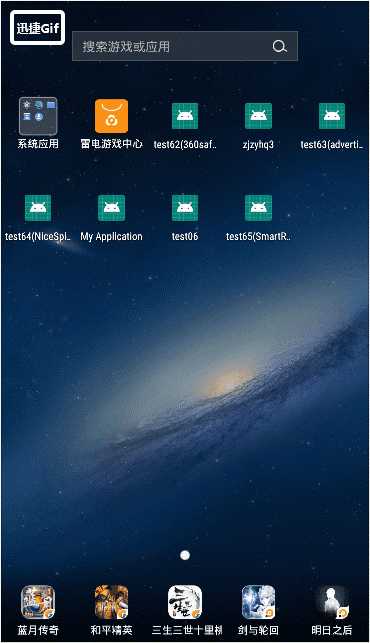标签:turn encoding return ref over bin wrap color state
1.SmartRefreshLayout介绍
SmartRefreshLayout的目标是打造一个强大,稳定,成熟的下拉刷新框架,并集成各种的炫酷、多样、实用、美观的Header和Footer。 正如名字所说,SmartRefreshLayout是一个“聪明”或者“智能”的下拉刷新布局,由于它的“智能”,它不只是支持所有的View,还支持多层嵌套的视图结构。 它继承自ViewGroup 而不是FrameLayout或LinearLayout,提高了性能。 也吸取了现在流行的各种刷新布局的优点,包括谷歌官方的 SwipeRefreshLayout, 其他第三方的 Ultra-Pull-To-Refresh、TwinklingRefreshLayout 。 还集成了各种炫酷的 Header 和 Footer。
2.使用步骤
(1)在 build.gradle (app)中添加依赖
implementation ‘com.scwang.smartrefresh:SmartRefreshLayout:1.1.0-alpha-26‘
implementation ‘com.scwang.smartrefresh:SmartRefreshHeader:1.1.0-alpha-26‘//没有使用特殊Header,可以不加这行
implementation ‘com.android.support:design:28.0.0‘
(2)布局文件(使用SmartRefreshLayout和RecyclerView)
<?xml version="1.0" encoding="utf-8"?> <com.scwang.smartrefresh.layout.SmartRefreshLayout xmlns:android="http://schemas.android.com/apk/res/android" android:id="@+id/refreshLayout" android:layout_width="match_parent" android:layout_height="match_parent"> <android.support.v7.widget.RecyclerView android:id="@+id/my_recycler_view" android:layout_width="match_parent" android:layout_height="match_parent" android:overScrollMode="never" android:scrollbars="vertical" android:background="#fff" /> </com.scwang.smartrefresh.layout.SmartRefreshLayout>
(3)RecyclerView的item布局
<?xml version="1.0" encoding="utf-8"?> <RelativeLayout xmlns:android="http://schemas.android.com/apk/res/android" android:layout_width="match_parent" android:layout_height="wrap_content" > <TextView android:id="@+id/text" android:layout_width="wrap_content" android:layout_height="60dp" android:layout_centerHorizontal="true" android:layout_marginTop="28dp" android:textSize="16sp" android:textStyle="bold" android:text="hehe"/> </RelativeLayout>
(4)java后台
package com.example.administrator.test65smartrefreshlayout; import android.support.annotation.NonNull; import android.support.v7.app.AppCompatActivity; import android.os.Bundle; import android.support.v7.widget.DividerItemDecoration; import android.support.v7.widget.LinearLayoutManager; import android.support.v7.widget.RecyclerView; import android.view.LayoutInflater; import android.view.View; import android.view.ViewGroup; import android.widget.TextView; import com.scwang.smartrefresh.header.MaterialHeader; import com.scwang.smartrefresh.layout.api.RefreshLayout; import com.scwang.smartrefresh.layout.constant.SpinnerStyle; import com.scwang.smartrefresh.layout.footer.BallPulseFooter; import com.scwang.smartrefresh.layout.listener.SimpleMultiPurposeListener; import java.util.ArrayList; public class MainActivity extends AppCompatActivity { RecyclerView mRecyclerView; MyAdapter mAdapter; LinearLayoutManager mLayoutManager; RefreshLayout refreshLayout; @Override protected void onCreate(Bundle savedInstanceState) { super.onCreate(savedInstanceState); setContentView(R.layout.activity_main); initView(); mRecyclerView = findViewById(R.id.my_recycler_view); mLayoutManager = new LinearLayoutManager(this); mRecyclerView.setLayoutManager(mLayoutManager); mRecyclerView.addItemDecoration(new DividerItemDecoration(this, LinearLayoutManager.VERTICAL)); mRecyclerView.setHasFixedSize(true); mAdapter = new MyAdapter(getDatas()); mRecyclerView.setAdapter(mAdapter); } private void initView() { refreshLayout = findViewById(R.id.refreshLayout); /** * 设置不同的头部、底部样式 */ // refreshLayout.setRefreshFooter(new ClassicsFooter(this).setSpinnerStyle(SpinnerStyle.Scale)); // refreshLayout.setRefreshHeader(new BezierRadarHeader(this)); // refreshLayout.setRefreshHeader(new TwoLevelHeader(this)); refreshLayout.setRefreshFooter(new BallPulseFooter(this).setSpinnerStyle(SpinnerStyle.Scale)); refreshLayout.setRefreshHeader(new MaterialHeader(this).setShowBezierWave(true)); //设置样式后面的背景颜色 refreshLayout.setPrimaryColorsId(R.color.colorPrimary, android.R.color.white); //设置监听器,包括顶部下拉刷新、底部上滑刷新 refreshLayout.setOnMultiPurposeListener(new SimpleMultiPurposeListener(){ @Override public void onRefresh(@NonNull RefreshLayout refreshLayout) { mAdapter.refreshData(MoreDatas()); //下拉刷新,数据从上往下添加到界面上 refreshLayout.finishRefresh(1000); //这个记得设置,否则一直转圈 } @Override public void onLoadMore(@NonNull RefreshLayout refreshLayout) { mAdapter.loadMore(MoreDatas()); //上滑刷新,数据从下往上添加到界面上 refreshLayout.finishLoadMore(1000); //这个记得设置,否则一直转圈 } }); } //原始的recyclerView数据 private ArrayList<String> getDatas() { ArrayList<String> data = new ArrayList<>(); String temp = " item"; for(int i = 0; i < 15; i++) { data.add(i + temp); } return data; } //刷新得到的数据 private ArrayList<String> MoreDatas() { ArrayList<String> data = new ArrayList<>(); String temp = "新加数据 "; for(int i = 0; i < 6; i++) { data.add(temp + i); } return data; } public static class MyAdapter extends RecyclerView.Adapter<MyAdapter.ViewHolder> { public ArrayList<String> datas = null; public MyAdapter(ArrayList<String> datas) { this.datas = datas; } //创建新View,被LayoutManager所调用 @Override public ViewHolder onCreateViewHolder(ViewGroup viewGroup, int viewType) { View view = LayoutInflater.from(viewGroup.getContext()).inflate(R.layout.recyclerview_smartrefreshlayout_item,viewGroup,false); ViewHolder vh = new ViewHolder(view); return vh; } //将数据与界面进行绑定的操作 @Override public void onBindViewHolder(ViewHolder viewHolder, int position) { viewHolder.mTextView.setText(datas.get(position)); } //获取数据的数量 @Override public int getItemCount() { return datas.size(); } //底部上拉刷新,数据直接在底部显示 public void loadMore(ArrayList<String> strings) { datas.addAll(strings); notifyDataSetChanged(); } //底部下拉刷新,数据直接从上往下添加数据,显示在顶部 public void refreshData(ArrayList<String> strings) { datas.addAll(0, strings); notifyDataSetChanged(); // notifyItemInserted(0); 一次只能加一项数据 } //自定义的ViewHolder,持有每个Item的的所有界面元素 public static class ViewHolder extends RecyclerView.ViewHolder { public TextView mTextView; public ViewHolder(View view){ super(view); mTextView = view.findViewById(R.id.text); } } } }
3.效果图

032 Android智能下拉刷新框架-SmartRefreshLayout+RecyclerView的使用
标签:turn encoding return ref over bin wrap color state
原文地址:https://www.cnblogs.com/luckyplj/p/10888512.html